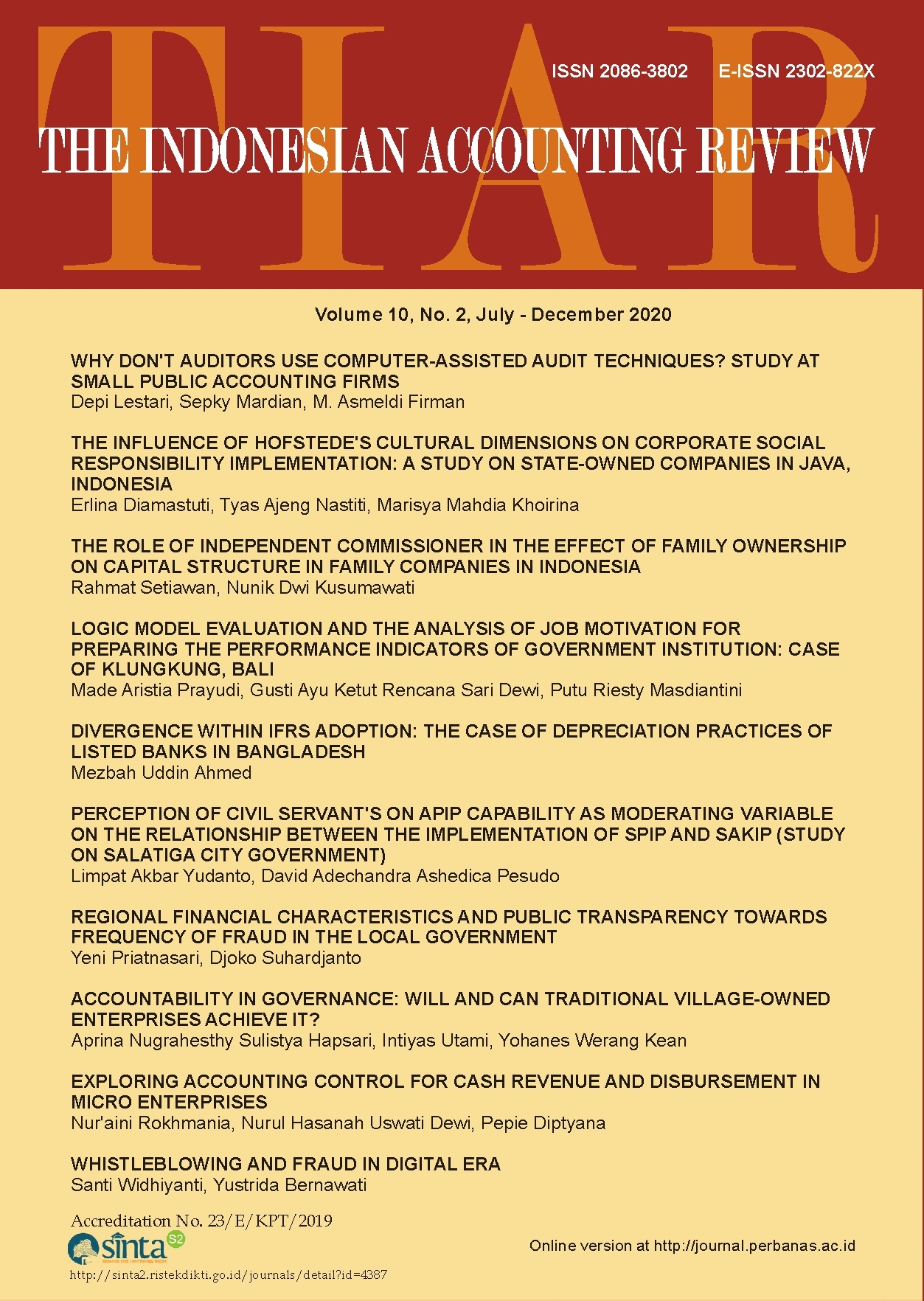The influence of hofstede’s cultural dimensions on corporate social responsibility implementation: a study on state-owned companies in Java, Indonesia
DOI:
https://doi.org/10.14414/tiar.v10i2.1843Keywords:
Culture, Corporate Social Responsibility, Hofstede's Culture dimensionAbstract
This study aims to examine the influence of Hofstede’s cultural dimension on the implementation of Corporate Social Responsibility at State-Owned Companies in Java, Indonesia. The data were analysed using multiple linear regression analysis with the sample consisting of 100 employees at 50 state-owned company in Java, Indonesia taken by using a purposive sampling method and the return rate of the questionnaire is 62%. The results indicate that the five dimensions of Hofstede’s culture only Power Distance and Individualism/ Collectivism have a positive and significant effect on the implementation of Corporate Social Responsibility by State-Owned Companies in Indonesia, while Uncertainty Avoidance, Masculinity/ Femininity and Long-term/ Short-term Orientation have a negative but not significant effect on the implementation of Corporate Social Responsibility. The results also indicate that not all of Hofstede’s cultural dimensions affect the implementation of corporate social responsibility to state-owned companies in Java, Indonesia. This research is expected to provide benefits for researchers and the community that culture is one of the factors that can be considered as a component that can influence the implementation of Corporate Social Responsibility.
References
Aguilera, R. V, Rupp, D. E., Williams, C. A., & Ganapathi, J. (2007). Putting the S Back in Corporate Social Responsibility : A Multilevel Theory of Social Change in Organizations. Academy of Management Review, 32(3), 836–863.
Alumaran, S., Bella, G., & Chen, F. (2015). The Role and Impact of Cultural Dimensions on Information Systems Security in Saudi Arabia National Health Service. International Journal of Computer Applications, 112(11), 21–27.
Bhardwaj, P., Chatterjee, P., Demir, K. D., & Turut, O. (2018). When and how is corporate social responsibility profitable? Journal of Business Research, 84. https://doi.org/10.1016/j.jbusres.2017.11.026
Boehe, D. M., & Cruz, L. B. (2010). Corporate social responsibility, product differentiation strategy and export performance. Journal of Business Ethics, 91(SUPPL 2), 325–346. https://doi.org/10.1007/s10551-010-0613-z
Burton, B. K., Farh, J.-L. L., & Hegarty, W. H. (2011). A Cross-Cultural Comparison of Corporate Social Responsibility Orientation: Hong Kong vs. United States Students. SSRN Electronic Journal, (February), 151–167. https://doi.org/10.2139/ssrn.1007364
Burton, B. K., & Lih Fah, J. (2000). A Cross-Cultural Comparison of Corporate Social Responsibility Orientation : Hong Kong vs . United States Students. Teaching Business Ethucs, 4(May), 151–167. https://doi.org/10.1023/A
Campbell, J. L. (2013). Why Would Corporations Behave In Socially Responsible Ways? An Institutional Theory Of Corporate Social Responsibility. Academy of Management Review, 32(3), 946–967.
Caprar, D. V., Devinney, T. M., Kirkman, B. L., & Caligiuri, P. (2015). Conceptualizing and measuring culture in international business and management: From challenges to potential solutions. Journal of International Business Studies, 46(9), 1011–1027. https://doi.org/10.1057/jibs.2015.33
Carroll, A. B. (2004). The pyramid of corporate social responsibility: Toward the moral management of organizational stakeholders. Business Horizons. https://doi.org/10.1016/0007-6813(91)90005-g
Carroll, A. B. (2009). A History of Corporate Social Responsibility: Concepts and Practices. In The Oxford Handbook of Corporate Social Responsibility. https://doi.org/10.1093/oxfordhb/9780199211593.003.0002
Carroll, A. B., & Shabana, K. M. (2010). The business case for corporate social responsibility: A review of concepts, research and practice. International Journal of Management Reviews. https://doi.org/10.1111/j.1468-2370.2009.00275.x
Cheruiyot, T. K., & Onsando, P. (2016). Corporate social responsibility in Africa: context, paradoxes, stakeholder orientations, contestations and reflections. Corporate Social Performance in the Age of Irresponsibility- Cross National Perspective, (February 2017), 89–110.
Cohen, D., Nisbett, R. E., Bowdle, B. F., & Schwarz, N. (1996). Insult, Aggression, and the Southern Culture of Honor. Journal of Personality and Social Psychology, 70(5), 945–960. Retrieved from http://search.ebscohost.com/login.aspx?direct=true&db=pdh&AN=1996-01753-004&site=ehost-live
Cramer, J. (2013). The future of corporate social responsibility. In Corporate Social Responsibility and Globalisation: An Action Plan for Business. https://doi.org/10.9774/gleaf.978-1-909493-66-7_8
Crossland, C., & DC. Hambrick. (2011). Difference in Managerial Discretion Across Countries: How Nation-Level institutions Affect The Degree to Which CEOS Matter. Strategic Management Journal, 127(1), 797–819. https://doi.org/10.1002/smj
Danon-Leva, E., Cavico, F., & Mujtaba, B. (2010). Business Ethics: A Cross-Cultural Comparison between Hong Kong and the United States. Journal of Business Studies Quarterly, 1(4), 1–20.
Dobers, P., & Halme, M. (2009). Corporate social responsibility and developing countries. Corporate Social Responsibility and Environmental Management. https://doi.org/10.1002/csr.212
Džupina, M. (2016). A theoretical study on cross-national differences on corporate social responsibility orientation (CSRO). European Journal of Science and Theology, 12(1), 163–169.
Friedman, M. (2007). The Social Responsibility of Business Is to Increase Its Profits. In Corporate Ethics and Corporate Governance. https://doi.org/10.1007/978-3-540-70818-6_14
GĂnescu, C., Gangone, A., & Asandei, M. (2014). Assessing the Impact of the National Cultural Framework on Responsible Corporate Behaviour towards Consumers: an Application of Geert Hofstede’s Cultural Model. Amfiteatru Economic Journal, XVI, 351–366.
Gualtieri, I., & Topić, M. (2016). Exploring corporate social responsibility’s global and Glocal practices in Qatar: A practitioner and stakeholder perspective. Arab Economic and Business Journal, 11(1), 31–54. https://doi.org/10.1016/j.aebj.2016.01.001
Halkos, G., & Skouloudis, A. (2016). Cultural dimensions and corporate social responsibility: A cross-country analysis. Munich Personal PePEc Archive (MPRA), (1), 1–22. Retrieved from https://mpra.ub.uni-muenchen.de/69222/1/
Halkos, G., & Skouloudis, A. (2017). Revisiting the relationship between corporate social responsibility and national culture: A quantitative assessment. Management Decision, 55(3), 595–613. https://doi.org/10.1108/MD-12-2016-0868
Hofstede, G. (2011). Dimensionalizing Cultures: The Hofstede Model in Context. Online Readings in Psychology and Culture, 2(1), 1–26. https://doi.org/10.9707/2307-0919.1014
Hofstede, G., & G.Hofstede. (1985). Cultures and Organizations : Software of the Mind. In Executive Book Summary (pp. 1–8).
Ioannou, I., & Serafeim, G. (2012). What Drivers Corporate Socia Performance? The Roe of Natiion-Level Institutions. Http://Ssrn.Com/Abstract=1661925, July, 2012.
Ismail, M. (2009). Corporate Social Responsibility And Its Role In Community Development: An International Perspective. The Journal of International Social Research, 2(9), 199–209.
Jamali, D., & Karam, C. (2018). Corporate Social Responsibility in Developing Countries as an Emerging Field of Study. International Journal of Management Reviews, 20(1). https://doi.org/10.1111/ijmr.12112
Jamali, D., & Neville, B. (2011). Convergence Versus Divergence of CSR in Developing Countries: An Embedded Multi-Layered Institutional Lens. Journal of Business Ethics, 102(4), 599–621. https://doi.org/10.1007/s10551-011-0830-0
Karroum, D. B. (2012). The Cultural Influence On Corporate Social Responsibility Management Essay.
Kim, Y., & Kim, S. Y. (2010). The influence of cultural values on perceptions of corporate social responsibility: Application of hofstede’s dimensions to Korean public relations practitioners. Journal of Business Ethics, 91(4), 485–500. https://doi.org/10.1007/s10551-009-0095-z
Korroum, D.B. (2012). The Cultural Influence On Corporate Social Responsibility Management Essay. 1–5.
Księżak, P., & Fischbach, B. (2018). Triple Bottom Line: The Pillars of CSR. Journal of Corporate Responsibility and Leadership, 4(3), 95. https://doi.org/10.12775/jcrl.2017.018
Lee, M., & Kim, H. (2017). Exploring the organizational culture’s moderating role of effects of corporate social responsibility (CSR) on firm performance: Focused on corporate contributions in Korea. Sustainability, 9(10), 1–18. https://doi.org/10.3390/su9101883
Lee, S. Y., & Carroll, C. E. (2011). The Emergence, Variation, and Evolution of Corporate Social Responsibility in the Public Sphere, 1980-2004: The Exposure of Firms to Public Debate. Journal of Business Ethics, 104(1), 115–131. https://doi.org/10.1007/s10551-011-0893-y
Lindgreen, A., & Swaen, V. (2009). Corporate Social Responsibility. International Journal of Management Reviews, 12(1), 1–7.
Lunenberg, K. (2014). The Influence of National Culture on the Implementation of Corporate Social Responsibility ? Students? Legitimacy in Universities. Retrieved from http://essay.utwente.nl/64664/
Mahmood, M., & Humphrey, J. (2013). Stakeholder Expectation of Corporate Social Responsibility Practices: A Study on Local and Multinational Corporations in Kazakhstan. Corporate Social Responsibility and Environmental Management, 20(3), 168–181. https://doi.org/10.1002/csr.1283
Millon, D. (2015). Corporate social responsibility and environmental sustainability. In Company Law and Sustainability: Legal Barriers and Opportunities. https://doi.org/10.1007/CBO9781107337978.004
Miska, C., Szőcs, I., & Schiffinger, M. (2018). Culture’s effects on corporate sustainability practices: A multi-domain and multi-level view. Journal of World Business, 53(2), 263–279. https://doi.org/10.1016/j.jwb.2017.12.001
Muhamad, R., & Salleh, N. A. M. (2019). The evolution of corporate social responsibility. In Strategic Corporate Social Responsibility in Malaysia. https://doi.org/10.4324/9780429057182-1
Nasieku, T., Togun, O. R., & Olubunmi, E. M. (2014). Corporate Social Responsibility and Organizational Performance: A Theoretical Review. International Journal of Humanities Social Sciences and Education, 1(12), 106–114. Retrieved from www.arcjournals.org
Nguyen, M., & Truong, M. (2016). The Effect of Culture on Enterprise’s Perception of Corporate Social Responsibility: The Case of Vietnam. Procedia CIRP, 40, 681–687. https://doi.org/10.1016/j.procir.2016.01.154
Peng, Y.-S., Dashdeleg, A.-U., & Chih, H. L. (2014). Culture and Firm’s CSR Engagement: A Cross-Nation Study. Journal of Marketing and Management, 5(1), 38.
Peng, Y., Dashdeleg, A., & Chih, H. L. (2012). Does National Culture Influence Firm’s CSR Engagement: a Cross Country Study. Ipedr, 15, 1–5. https://doi.org/10.7763/IPEDR
Rahmawani, & Hartanti, D. (2010). Pengaruh Budaya dan Sosial Politik Terhadap Tampilan Situs Laporan Pertanggungjawaban Sosial Perusahaan. Simposium Nasionnal Akuntansi XIII, 1–42.
Ringov, D., & Zollo, M. (2007). Corporate responsibility from a socio-institutional perspective: The impact of national culture on corporate social performance. Corporate Governance, 7(4), 476–485. https://doi.org/10.1108/14720700710820551
Roberts, R. W. (1992). Determinants of corporate social responsibility disclosure: An application of stakeholder theory. Accounting, Organizations and Society. https://doi.org/10.1016/0361-3682(92)90015-K
Salvi, A., Giakoumelou, A., & Petruzelle, F. (2017). The impact of national culture on corporate environmental performance: How much does your origin say about how green you are ? Journal of Environmental Sustainability, 5(1). Retrieved from https://pdfs.semanticscholar.org/5155/cc1561b954f1695c3d6ffca13c04b103b8f4.pdf
Shim, K., Chung, M., & Kim, Y. (2017). Does ethical orientation matter? Determinants of public reaction to CSR communication. Public Relations Review, 43(4). https://doi.org/10.1016/j.pubrev.2017.05.001
Sungkharat, U. (2010). Local Wisdom : The Development Of Community Culture and Production Processes In Thailand. International Business & Economics Research Journal, 9(11), 115–120.
Suriany, L. (2013). Penerapan Corporate Social Responsibility dengan Konsep Community Based Tourism. Jurnal ILMU KOMUNIKASI, 5(1), 25–40. https://doi.org/10.24002/jik.v5i1.216
Vitasurya, V. R. (2016). Local Wisdom for Sustainable Development of Rural Tourism, Case on Kalibiru and Lopati Village, Province of Daerah Istimewa Yogyakarta. Procedia - Social and Behavioral Sciences, 216(October 2015), 97–108. https://doi.org/10.1016/j.sbspro.2015.12.014
Waldman, D. A., De Luque, M. S., Washburn, N., & Adetown, B. (2006). Cultural and leadership predictors of corporate social responsibility values of top management: A GLOBE study of 15 countries. Journal of International Business Studies, 37(6), 823–837. https://doi.org/10.1057/palgrave.jibs.8400230
Widagdo, H. (2010). Corporate Social Responsibilities pada Multi National Corporations.
Widodo, J. (2012). Urban Environment and Human Behaviour: Learning from History and Local Wisdom. Procedia - Social and Behavioral Sciences, 42(July 2010), 6–11. https://doi.org/10.1016/j.sbspro.2012.04.161
Yakovleva, N., & Vazquez-Brust, D. (2012). Stakeholder Perspectives on CSR of Mining MNCs in Argentina. Journal of Business Ethics, 106(2), 191–211. https://doi.org/10.1007/s10551-011-0989-4
Yang, A. S., & Baasandorj, S. (2017). Exploring CSR and financial performance of full-service and low-cost air carriers. Finance Research Letters, 23. https://doi.org/10.1016/j.frl.2017.05.005
Downloads
Additional Files
Submitted
Published
How to Cite
Issue
Section
License
Copyright (c) 2020 The Indonesian Accounting Review

This work is licensed under a Creative Commons Attribution-NonCommercial 4.0 International License.

















